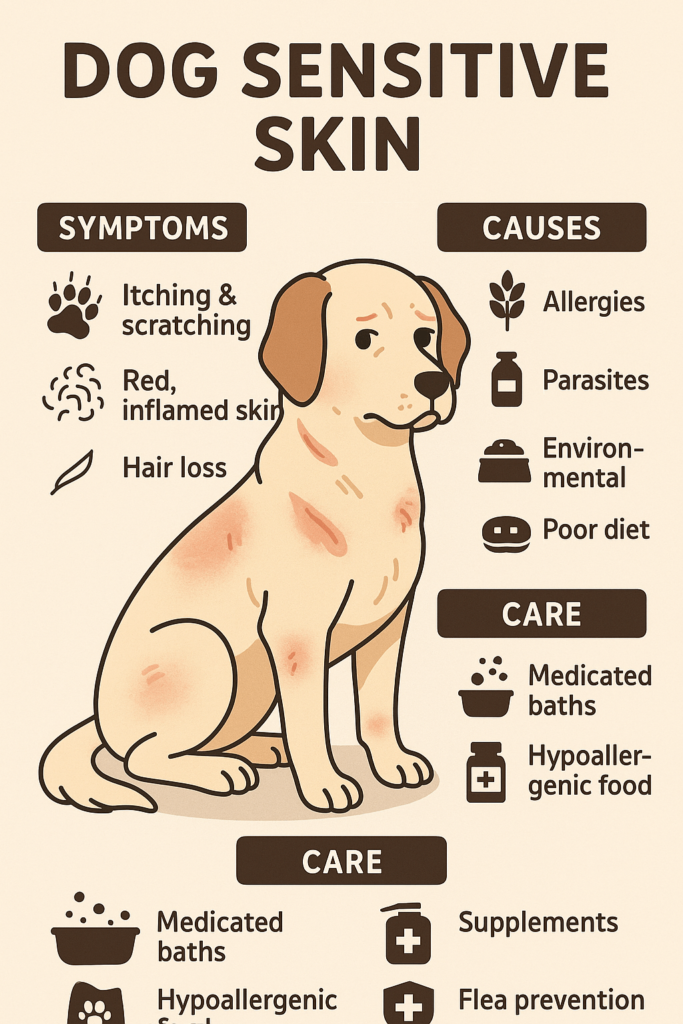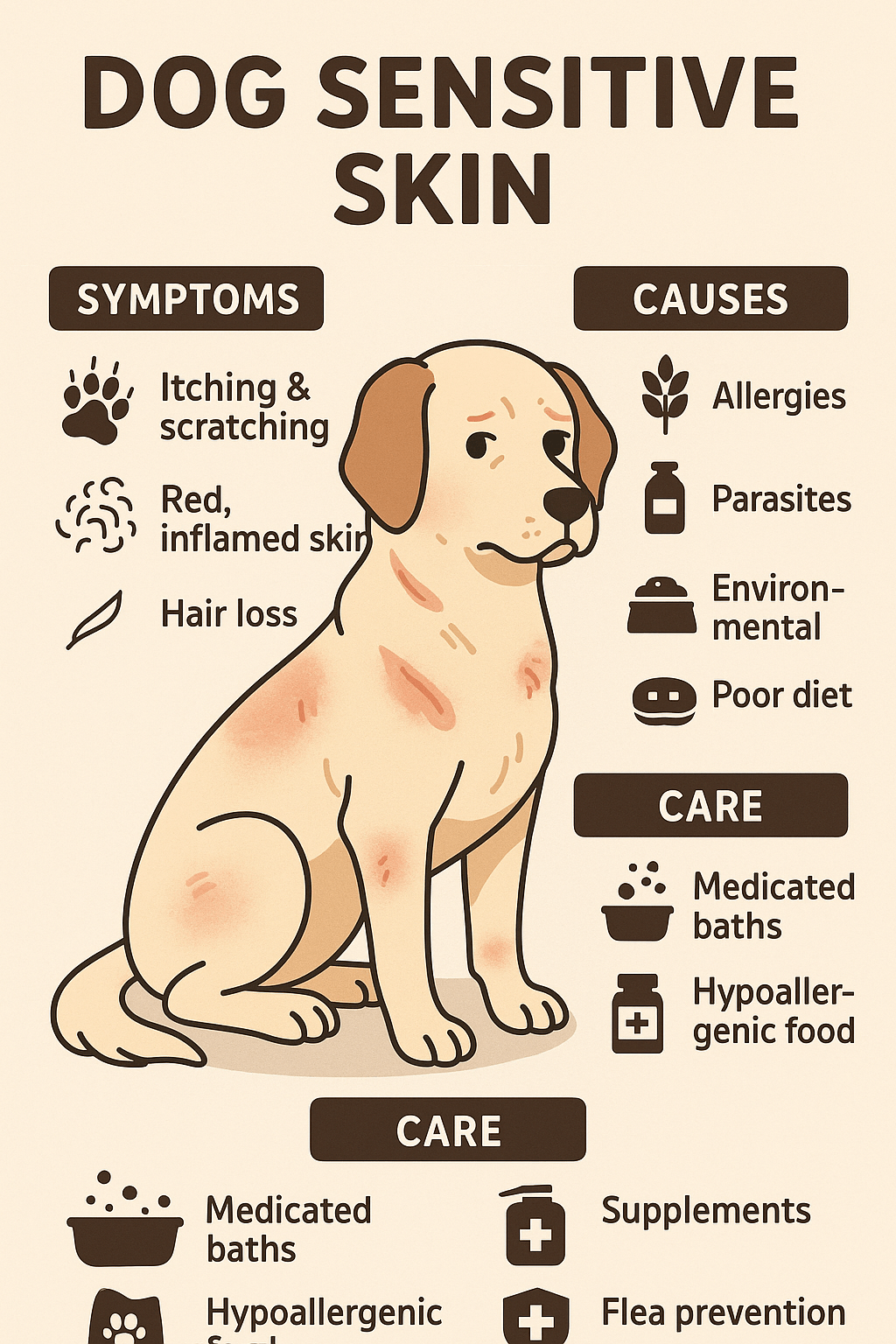Understanding Dog Sensitive Skin: Causes and Solutions
Dogs, like humans, can suffer from sensitive skin, which often manifests as itching, redness, or irritation. This condition can be uncomfortable for your furry friend and concerning for you as a pet owner. Whether it’s due to allergies, environmental factors, or improper grooming, understanding the root causes of sensitive skin is the first step toward providing relief. In this blog post, we’ll explore the common triggers of sensitive skin in dogs, practical tips for managing it, and how to ensure your pup stays happy and healthy. With the right care and attention, you can help your dog feel more comfortable and enjoy life to the fullest.
Expert Insight: Understanding Allergies in Dogs
“Allergies are one of the most common conditions affecting the skin in dogs. Dogs can be allergic to fleas, food ingredients, or environmental allergens like pollens, grass, dust, and mold. Often, dogs are allergic to a combination of substances, such as both chicken and pollen. Exposure to allergens causes the dog’s body to release a chemical called histamine that triggers intense itchiness.”
Common Causes of Sensitive Skin in Dogs
Sensitive skin in dogs can stem from a variety of factors, ranging from dietary issues to external irritants. Identifying the underlying cause is crucial for effective treatment and prevention.
Food Allergies:
Certain ingredients in dog food, such as beef, chicken, or grains, can trigger allergic reactions that lead to skin irritation.Environmental Allergens:
Pollen, dust mites, and mold are common culprits that can cause itching and discomfort in dogs with sensitive skin.Flea Bites:
Flea saliva contains proteins that can irritate a dog’s skin, leading to intense scratching and inflammation.Harsh Shampoos or Cleaning Products:
Using products not specifically formulated for dogs can strip their skin of natural oils, causing dryness and irritation.Genetic Predisposition:
Some breeds, such as Bulldogs and Retrievers, are more prone to skin sensitivities due to their genetic makeup.
By pinpointing the specific cause of your dog’s sensitive skin, you can take targeted steps to alleviate their discomfort and prevent future flare-ups.

Common Causes of Sensitive Skin in Dogs
Sensitive skin in dogs can stem from a variety of factors, ranging from dietary issues to external irritants. Identifying the underlying cause is crucial for effective treatment and prevention.
Food Allergies:
Certain ingredients in dog food, such as beef, chicken, or grains, can trigger allergic reactions that lead to skin irritation.Environmental Allergens:
Pollen, dust mites, and mold are common culprits that can cause itching and discomfort in dogs with sensitive skin.Flea Bites:
Flea saliva contains proteins that can irritate a dog’s skin, leading to intense scratching and inflammation.Harsh Shampoos or Cleaning Products:
Using products not specifically formulated for dogs can strip their skin of natural oils, causing dryness and irritation.Genetic Predisposition:
Some breeds, such as Bulldogs and Retrievers, are more prone to skin sensitivities due to their genetic makeup.
By pinpointing the specific cause of your dog’s sensitive skin, you can take targeted steps to alleviate their discomfort and prevent future flare-ups.
Check this guide 👉Black Skin Disease in Dogs: Best 7 Expert Tips!
Check this guide 👉Dog Skin Conditions: Best 7 Expert Tips!
Check this guide 👉Skin Cancer Lump on Dog: Best 7 Expert Tips!
Preventive Measures for Sensitive Skin | Treatment Options for Sensitive Skin |
|---|---|
Feed hypoallergenic or grain-free diets | Use medicated shampoos prescribed by vets |
Regularly groom and bathe your dog | Apply topical ointments for irritation |
Keep fleas and ticks under control | Administer antihistamines for allergies |
Avoid harsh chemicals in cleaning products | Provide omega-3 supplements for hydration |
Monitor environmental allergens | Seek vet advice for persistent symptoms |
Best Practices for Bathing a Dog with Sensitive Skin
Bathing is an essential part of caring for a dog with sensitive skin, but it must be done carefully to avoid further irritation. Follow these best practices to keep your dog clean and comfortable.
Use Hypoallergenic Shampoos:
Choose shampoos specifically designed for dogs with sensitive skin to prevent drying or irritation.Bathe Sparingly:
Over-bathing can strip your dog’s skin of natural oils. Limit baths to once every few weeks unless advised otherwise by your vet.Rinse Thoroughly:
Ensure all soap residue is washed off, as leftover shampoo can irritate the skin and cause discomfort.Maintain Water Temperature:
Use lukewarm water instead of hot water to avoid drying out your dog’s skin during baths.Moisturize After Bathing:
Apply a vet-recommended conditioner or leave-in moisturizer to hydrate your dog’s skin post-bath.
By following these bathing tips, you can minimize irritation and maintain your dog’s skin health effectively.
Dietary Adjustments for Dogs with Sensitive Skin
What your dog eats plays a significant role in managing sensitive skin. Making dietary adjustments can help reduce flare-ups and improve overall skin health.
Switch to Hypoallergenic Food:
Hypoallergenic diets eliminate common allergens and focus on novel protein sources like duck or venison.Incorporate Omega-3 Fatty Acids:
Omega-3 supplements, such as fish oil, promote skin hydration and reduce inflammation.Avoid Artificial Additives:
Steer clear of foods containing artificial colors, flavors, or preservatives, which can exacerbate skin issues.Introduce Probiotics:
Probiotics support gut health, which is closely linked to skin health and immune function.Monitor Portion Sizes:
Overfeeding can lead to obesity, which may worsen skin folds and trap moisture, increasing the risk of irritation.
A balanced and thoughtful diet can make a world of difference for dogs struggling with sensitive skin.
Natural Remedies for Dog Sensitive Skin
For pet owners seeking natural solutions, several remedies can soothe your dog’s sensitive skin without relying on harsh chemicals. These options are gentle yet effective when used correctly.
Coconut Oil:
Applying small amounts of coconut oil to irritated areas can moisturize the skin and reduce inflammation.Oatmeal Baths:
Oatmeal has soothing properties that relieve itching and calm sensitive skin during baths.Aloe Vera Gel:
Pure aloe vera gel can hydrate and heal irritated skin, but ensure it’s free of additives or alcohol.Chamomile Tea Compress:
Soak a cloth in cooled chamomile tea and apply it to affected areas to reduce redness and irritation.Apple Cider Vinegar Spray:
Diluted apple cider vinegar sprayed on the coat can act as a natural antiseptic and relieve itchiness.
Natural remedies offer safe alternatives for managing sensitive skin, though consulting your vet is always recommended.
Preventing Seasonal Skin Issues in Dogs
Seasonal changes can exacerbate sensitive skin in dogs, particularly during spring and fall. Taking preventive measures can help minimize seasonal flare-ups.
Limit Outdoor Time During High Pollen Seasons:
Keep your dog indoors during peak pollen hours to reduce exposure to environmental allergens.Wipe Down Paws After Walks:
Use damp cloths to clean your dog’s paws after outdoor activities to remove allergens and irritants.Invest in Air Purifiers:
Air purifiers with HEPA filters can reduce indoor allergens, creating a safer environment for your dog.Keep Bedding Clean:
Wash your dog’s bedding regularly to remove dust mites and other potential irritants.Monitor Humidity Levels:
Maintain optimal humidity levels in your home to prevent dry skin, which can worsen sensitivity.
Proactive measures during seasonal shifts can significantly ease your dog’s skin discomfort.
Signs Your Dog Needs Veterinary Attention
While many cases of sensitive skin can be managed at home, some situations require professional intervention. Knowing when to seek veterinary care ensures your dog receives timely treatment.
Persistent Itching Despite Home Care:
If your dog continues to scratch excessively despite your efforts, it may indicate an underlying condition.Open Wounds or Bleeding:
Broken skin or bleeding requires immediate attention to prevent infection and further complications.Unexplained Hair Loss:
Sudden or widespread hair loss could signal hormonal imbalances or systemic issues needing diagnosis.Behavioral Changes:
Lethargy, aggression, or withdrawal may indicate that your dog is experiencing significant discomfort.Recurring Ear or Skin Infections:
Frequent infections suggest an ongoing problem that needs specialized treatment.
Knowing when to consult your vet ensures your dog receives the care they need to thrive.
Frequently Asked Questions About Dog Sensitive Skin
Can sensitive skin in dogs be cured?
While sensitive skin cannot always be “cured,” it can be effectively managed with proper care and treatment.
How often should I bathe my dog with sensitive skin?
Typically, once every 3-4 weeks is sufficient, but follow your vet’s recommendations based on your dog’s needs.
Are certain breeds more prone to sensitive skin?
Yes, breeds like Bulldogs, Retrievers, and Terriers are more susceptible due to genetic factors.
Can fleas cause sensitive skin?
Absolutely—flea bites can trigger severe itching and irritation, especially in dogs with pre-existing sensitivities.
Should I use human shampoo on my dog?
No, human shampoos are too harsh and can worsen sensitive skin. Always use products formulated for dogs.
Caring for Your Dog’s Sensitive Skin: A Labor of Love
Managing sensitive skin in dogs requires patience, observation, and a proactive approach to care. By understanding the causes, recognizing the symptoms, and implementing preventive measures, you can significantly improve your dog’s quality of life. Whether through dietary changes, gentle grooming, or veterinary treatments, every step you take brings comfort and relief to your furry companion. Remember, a happy dog starts with healthy skin—and with the right strategies, you can ensure your pup enjoys a life full of joy and vitality.
Cat Anaphylactic Shock Treatment Costs: Best 7 Expert Tips! – Learn about costs, treatments, and financial aid options to save your cat’s life.
Exocrine Pancreatic Insufficiency in Cats: Best 7 Tips! – Learn to spot symptoms, manage EPI effectively, and improve your cat’s quality of life with expert advice.
Cost of Dog Anaphylactic Shock Treatment: Best 7 Tips! – Learn about emergency costs, financial planning, and ways to manage expenses for your dog’s care.
Exocrine Pancreatic Insufficiency in Dogs: Best 7 Tips! – Learn to spot symptoms, manage EPI effectively, and improve your dog’s quality of life with expert guidance.





